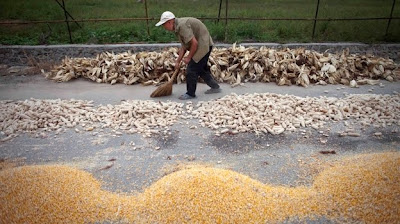
Monday, May 9, 2011
No Impact Man

Global Warming Trends Take a Bite Out of Important Crops

According to Wolfram Schlenker, a teacher environmental economics and coauthor of the study, for two crops, corn and wheat, there has actually been a steady decline in yields over the past 30 years. The scientists looked specifically at places in the world where warming trends are most pronounced and, sure enough, they found these staple crops weren't doing quite as well. For rice and soy, declines in some places were offset by productivity boosts elsewhere in the world, so there was no overall change. But they did see a change for wheat and corn. The losses caused by warming thus far are still smaller than the gains made though improved agriculture, but rather than seeing gains in yield, as would be expected form the improvements, yields are only managing to remain stable.
The study, published online by Science magazine, shows that these crops have declined about 5 percent over what they would have been in the absence of warming. That sounds small, until you consider that globally, these crops are worth about a trillion dollars a year. And according to Gerald Nelson at the International Food Policy Research Institute in Washington, D.C., as the planet heats up in the coming decades, the 5 percent loss seen today could easily grow to 20 percent. No small change, if you ask me.
To add insult to injury, most of these yield problems hit people who can afford it the least. Those Who hurt most are people who spend the greatest portion of their income on food, and in developing countries, this can be as high as 40% annually. Here in the United States, a doubling of wheat prices might only add, say, a dime to the cost of a $2 loaf of bread, but double the price of rice and people who fill their food bowl with that grain every day will really feel it.
Americans are also insulated from this effect for another reason. The new study found that the effects of warming have not been felt evenly around the world, since the temperature trends themselves are not evenly distributed.And since America's breadbasket has not warmed significantly, American grain farmers have been fortunate. Professor Gene Takle at Iowa State University says farmers in the Midwest have actually dealt with a long-term trend of additional rainfall in that area.
Midwestern farmers have adapted to the added wetness by spraying more pesticides to control fungus, by planting more per acre, and by buying bigger machines to cope with the wetter fields. But there are limits, and many other farmers around the world are already starting to find out where those limits lie as they confront higher temperatures.
Tuesday, May 3, 2011
# 17
Blog 17-This is the end
The End
Sunday, May 1, 2011
Blog 17 - Final Thoughts
The last discussion was very interesting; Thanks Joel! All the topics were very interesting and thought provoking. One thing I have thought of in discussions about deep and shallow ecology is that we may be underplaying the importance of shallow ecology. The deep ecologists continually say that shallow ecology is useless and that everyone needs a completely new mind set that is environmentally friendly. When looking at this it seems bizarre. I don’t think anyone will wake up one morning and decide, “Hey I’m not going to create an impact on the earth, I’m not driving a car, etc”. That is completely unrealistic. I believe that shallow ecology, especially flannel ecology, creates a stepping stone that could eventually lead to a deep ecology mind set. By going out and planting trees, spending time in wilderness, or cleaning parks, a person may develop a love for the land. From this love may come the deep ecology mindset that is needed for sustainability on earth. I believe that shallow ecology is the only thing that makes deep ecology possible. I doubt any deep ecologist just became one over night, I imagine they had many experiences in nature that were “shallow” that developed their current view point.
The only problem with Tori’s statement about reintroducing predators into the wilds to control populations, thereby reducing the need to hunt is that its not plausible in today’s world. The populations of predators are decimated and the amount of wilderness left is shrinking fast. Predators require huge tracts of undisturbed land to sustain them, and there just isn’t enough of this left to maintain a healthy population. I know about the natural cycle that involves peaks and lows of prey and predator. The fact is that human interference is going to prevent the reemergence of predators. Also, lots of overpopulation of deer, rabbits, etc. occur in places such as Fort Thomas. Obviously a large population of predators cannot be maintained in such an environment.
I think many people took Joel’s presentation the wrong way. Its a philosophical discussion and some people took it personally. The fact that everyone fails to see is that the points he brings up actually would help control population. Its just that nobody wants to be controlled by regulations or make sacrifices. That is the reason that this world is in trouble. We aren’t going to change as a society, because as a whole we are selfish. I find it funny that people say deep ecology is what needs to happen, but when it is disguised without a name people freak out. If a person was actually a deep ecologist they would take steps to lessen their impact on the world. This exemplifies that sadly, deep ecology is not feasible, because no one is willing to sacrifice their “rights”.